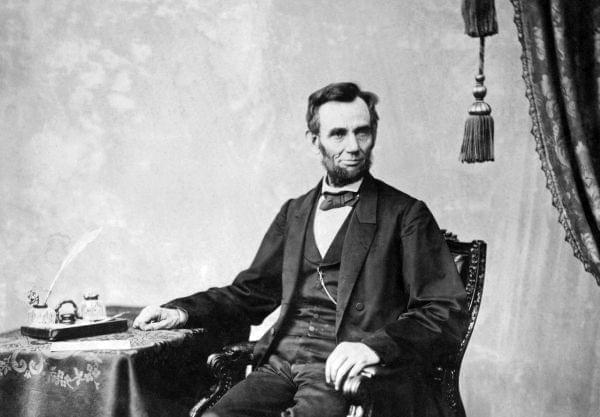Letters By Lincoln’s Law Partner

President Abraham Lincoln, photographed in Washington, DC by Alexander Gardner in 1863. Alexander Gardner/Wikimedia Commons
A newly edited volume of letters provides more insight into the nation's 16th president. “Herndon on Lincoln: Letters” was edited by Douglas Wilson and Rodney Davis, co-directors of the Lincoln Studies Center at Knox College in Galesburg.
“We’ve been on a project for 25 years to publish in a good editorial edition with annotation the archive collected by Lincoln’s law partner, William H. Herndon. He went around interviewing people that had known Lincoln and corresponding with them. And he, of course, knew Lincoln himself very closely,” said Wilson.
“His archive is invaluable. It’s indispensable for Lincoln biographers. It’s very well-known but it had never been thoroughly gone through and edited and published.”
Wilson and Davis previously collaborated on a collection of interviews and letters Herndon gathered from other people (Herndon’s Informants) and they did the annotations for the Lincoln biography Herndon wrote with Jesse Weik (Herndon’s Lincoln).
Wilson and Davis said they did a national search to find the letters for the latest volume. Wilson said Herndon corresponded with all kinds of people and would answer anybody’s letter. Davis said they had to winnow the collection of letters quite a bit.
“There are hundreds of letters that Herndon wrote that we have been able to collect over the years, far more than realistically could be published. So we had to go through this stash and make selections of letters that seemed to us to be most revealing or significant,” Davis said.
Wilson said he and Davis are not trying to champion Herndon through their research. Rather, their intent is to make information available so people can decide for themselves.
“What Herndon has to tell us in the letters is about the Lincoln he knew as an officemate -- as a law partner -- and as somebody that he had thoughtful conversation with on a daily basis,” said Wilson.
Wilson said as he went through Herndon’s letters, he was surprised by what Herndon had to say about Lincoln’s fatalism. He said that was not brought out in the biography he wrote with Weik.
“Lincoln’s favorite maxim – something that he was constantly repeating – was, ‘Whatever will be, will be. And no prayers of ours can reverse the decree,’” said Wilson. He said Herndon was quoted as saying melancholy dripped from Lincoln as he walked, though Herndon also noted Lincoln found ways to lift himself out of depression through stories and jokes.
Davis said he was surprised by Lincoln’s relationship with women.
“Although he never had disgraced himself, he was tempted by women to a degree that we don’t normally think was appropriate,” said Davis, who added the letters humanize Lincoln.
“There’s a lot more to Lincoln than the popular version we get in the movies and television.”
